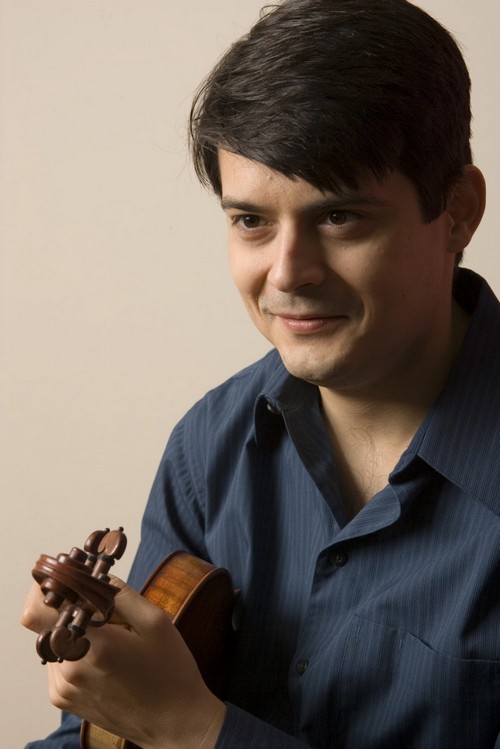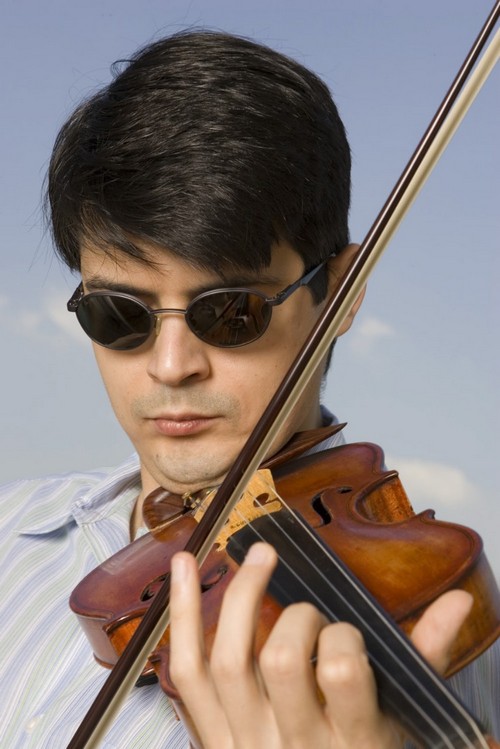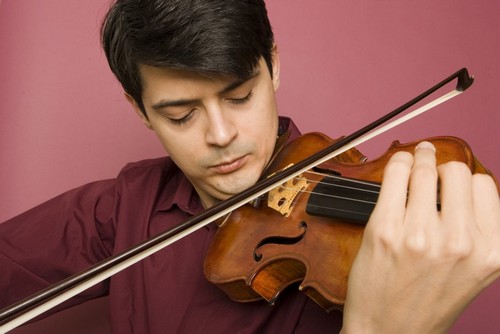Interview with Hristo Popov by Galya Mladenova

Hailed as “Virtuoso-violinist extraordinaire” by Musical Horizons, Hristo Popov, brings tremendous experience to the concert stage. Popov made his orchestral debut at the age of nine and since then has performed throughout the United States, England, Germany, Czech Republic, Poland, Bulgaria, Italy, Switzerland, and Mexico as both recitalist and concerto soloist. He is founding member of The New York Empire Trio exclusively presented by BV Artists, Inc. Their Carnegie Hall debut was hailed by The Strad Magazine as “…alert and energetic” and New York Concert Review as “…impassioned and unified, with each instrument shining individually”.
Hristo Popov is a prizewinner at the Kozian International Violin Competition, Silver Medalist at the California Young Artist Competition, winner of the Grand Prize at the International Institute of Music (Germany, USA), first place at the American String Teachers’ Association Chamber Music Competition. He has been selected as Artist of the Month at the Obama for Arts and Entertainment Organization in April of 2009. He has appeared as guest artist in numerous festivals such as Park City International Music Festival, Plovdiv International Chamber Music Festival, Sofia Musical Weeks Music Festival, Summit Music Festival in New York, Interharmony International Music Festival, among others. Popov has performed in major Performing Arts Centers in the United States including the Carnegie Hall, New York City, Dorothy Chandler Pavilion – Los Angeles, Severance Hall – Cleveland, John F. Kennedy Center – Washington D.C, and Casa Verdi – Milan, Italy.
You can read more about Hristo Popov here.
What inspired you to become a musician? How did you choose the violin?
I was always impressed with the sound of the violin and when I was four my mother asked me if I would like to play a musical instrument. She gave me a choice between violin and piano and I chose the violin. Ever since that day, the violin has been part of my life every single day.
The most important thing for a musician is his musical instrument. Tell us more about the violin you currently use – where is it made, how you got it, how long have you been playing it, etc?
One of the most important things is the musical instrument. There has to be a personal connection with it which is a relationship of continuous development. In some instances it requires patience, in others it requires a search for different musical colors, intonations. Each instrument brings a different quality to the personal expression of the artist. In my case, I have developed a long relationship with my violin in which I know what to expect from it and I feel that it knows me quite well. On some of my really good days I become one with it and it responds to me to perfection. I play on a violin made by Pietro Antonio Landolfi dating from 1775.
How many hours a day do you spend playing?
I try to spend at least 3 hours a day practicing, but on some days even this becomes a difficulty.

Do you find something new and exciting every time you play a piece of music that you’ve already played multiple times?
Always! There is really never a moment where you can say I know absolutely everything about this piece. Music is such a subjective art, that one can always put a different image to it.
Do you have a favorite piece of music? Which is it?
Usually the piece I am working on at the moment. There is so much amazing music that I would rather not limit myself to one particular work.
What was your first solo performance? What makes it memorable to you?
My first memorable solo performance was when I made my debut with an orchestra at the age of 9. I won the Concerto Competition at my school in Plovdiv, Bulgaria and was very anxious and excited to play with a professional orchestra. Since then I have performed over 20 concertos with orchestras, and look forward to playing more in the future.
Many musicians are superstitious. Is there a ritual you do before you step on the stage?
I have my ways of preparation before going on stage. I think that everyone is different about this. In my case, I really try to keep a normal schedule without exhausting myself before performance.
You’ve won a lot of awards. Which is the most valuable one to you and why?
Some awards are more difficult to achieve than others. They are all important to me because of the recognition that they bring to my work. However, I think that the best award or reward to a musician is to be able to communicate some of the greatest music written in history to the audience of today. It is such an enormously difficult task because one needs to overcome so many personal and physical issues and envelope himself or herself in the music of another being from the past.
You’re a founding member of The New York Empire Trio. Could you tell us more about it?
Since I was a young musician, I have always enjoyed playing in a piano trio. The New York Empire Trio is a group of like-minded musicians – myself, Kalin Ivanov (cello) and Elena Antimova (piano) – where we have the opportunity to present works for Piano Trio. The trio made it’s Carnegie Hall Debut in 2009 to very high critical acclaim from the press and has performed in major musical venues ever since. We are a relatively young ensemble in the music world, but we hope to bring fresh perspective to our interpretations and thus become the leading group in the field.

Whose opinion about your work has greatest importance to you?
My own opinion is most important and most critical. After that, I really value the input of my colleagues and always hope to learn from it.
You’re teaching in Youngstown State University and Western Reserve Academy in Ohio. Which is the most important lesson you teach your students?
I suppose there are more than a few important lessons in one’s education. However, above all is the passion for music.
On the other hand, have you learned something from the teaching process?
I really believe that if one is not learning than one is not teaching well. There are always some things that students will discover or come across that will surprise you and make your head turn. This is one of the blessings of the teaching profession.
Composers create works especially for you. How is playing these pieces different from playing “ordinary” pieces?
The thing about new works is that one becomes involved in a process that takes place right in front of your eyes and one has the opportunity to communicate directly with the creator of the music. Some of the greatest music was composed so long ago that we have lost the historical perspective and we have to recreate it in our minds and communicate it to our audience. With new works this process becomes much simpler.
You’ve already accomplished a lot. What’s your next goal?
My next goals are to continue working on my career as a soloist as well as my work with the New York Empire Trio and develop my violin class into one of the most successful in the world.











No comments so far ↓
Nobody has commented yet. Be the first!
Comment